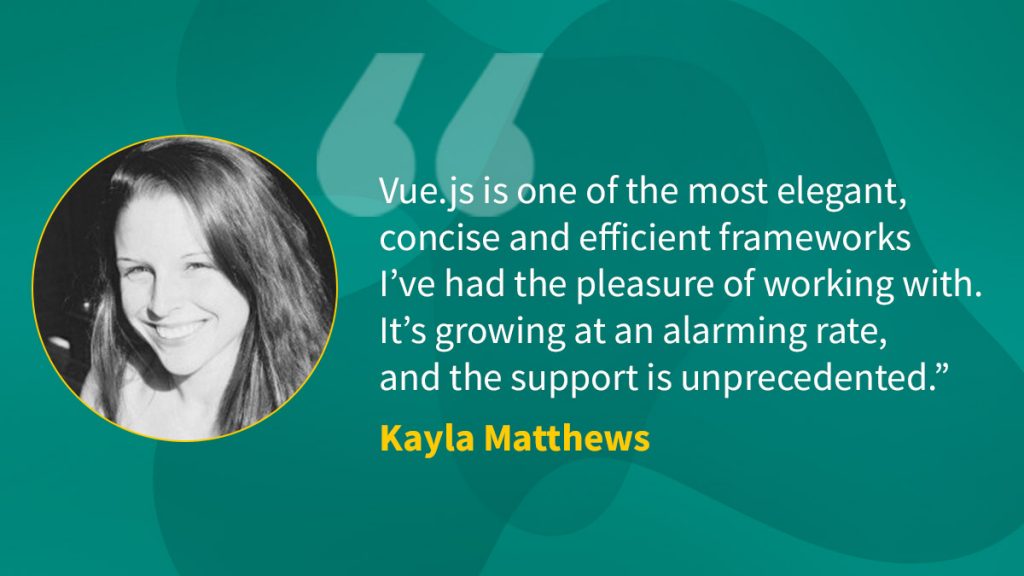Vue.js is a progressive JavaScript framework that enables developers to create compelling user interfaces with ease and efficiency. Although it’s gaining attention globally, particularly in the developer community, it hasn’t yet reached widespread recognition in certain regions. In this article, I’ll discuss why Vue.js deserves more attention and why it might be the right framework for your next project.
But look, I’ll be honest. Unfortunately, Vue.js has not seen a lot of attention or traction out West – where I happen to spend most of my time. In the international development community, it’s a growing sensation, with many a praise floating about. The problem, however, is that it’s not a household name, certainly not like jQuery.
In fact, I don’t think anything has ever been as popular as jQuery, so that’s not a fair comparison in hindsight, but you get the point. To make matters worse, most people are not familiar with the framework, if they’ve even heard of it. If you tend to stay on the leading edge of the development world it is not completely off the radar.
That said, it’s certainly not in use on a wide scale, at least not yet. That doesn’t mean it shouldn’t be, however – it should.
What is Vue.js?
Vue.js is designed to focus on the general experience of your application. The framework’s core layer is lean and adaptable, allowing developers to import existing libraries or integrate tools as needed. Its flexibility makes it ideal for creating robust single-page applications (SPA).
While it may not yet be a household name in every part of the world, it is rapidly gaining traction and recognition in international development communities.
Why You Should Use Vue.js for JavaScript Projects
Here are a few reasons why I believe it should be embraced more widely:
1. Easy to Learn
One of the simplest frameworks to learn and use, even for developers who are new to JavaScript. With just a few lines of JavaScript and some basic HTML, you can get started without needing an extensive background in programming. A compiler isn’t even required, making it a great choice for beginners.
2. Fast and Lightweight
Incredibly fast, largely because of a virtual DOM, similar to React. However, Vue.js is lighter in comparison, which leads to faster rendering and responsiveness. Designed to track dependencies efficiently, only re-rendering the components that need updates. This makes it an optimal choice for dynamic, high-performance applications.
3. Vue CLI for Quick Setup
It offers an official CLI that simplifies development. Bundled with multiple template options and supports tools like Browserify. The CLI accelerates the setup process, allowing developers to scaffold applications without dealing with repetitive boilerplate code. Even with updates like the jump from Vue.js 1.0 to 2.0, the framework remains easy to work with, showing the team’s commitment to stability and simplicity.
4. Growing and Active Community
One of the biggest strengths of the framework is its active and supportive community. Whether you need help troubleshooting issues or finding learning resources, the Vue.js community is there to assist. It has a strong presence on GitHub, frequent international conferences, and plenty of educational content. Evan You, the framework’s creator, is highly involved in the community, ensuring it remains a welcoming and helpful space for developers.
Personal Experiences with Vue.js
The list above offers some crucial reasons for why I think everyone should get involved with the framework or adopt it as a part of their JavaScript projects going forward. Yet, it doesn’t give a picture of my personal experiences or show the challenges and obstacles I’ve dealt with, does it?
I honestly just prefer using Vue.js over React – which is a default choice for many, albeit not the only one. It looks like I’m not alone in feeling this way, either (See Why we chose Vue.js over React). The community agrees, too, as you’ll see from this popularity graph from Google Trends.
Enough flexing my muscles, though. To keep it simple, I’ll say that Vue.js is one of the most elegant, concise and efficient frameworks I’ve had the pleasure of working with. Growing at an alarming rate, the support is unprecedented. Even good old Laravel added Vue.js to core, which is a sign of things to come.
Most importantly, it’s reliable, maintainable and interesting above all else. That last part is more important than you realize because you’ll be working with it constantly, plugging away at your keyboard and pouring over your code. If the framework or language is not at least semi-enjoyable for you, it’s going to be an awful trudge to the finish line – if you ever make it there.
Areas for Improvement
Although Vue.js is already a great framework, there are a few areas I’d like to see improved in the future:
- Runtime Errors: More descriptive runtime error messages would make debugging easier.
- Community Components: Some older community components need updates to stay compatible with the latest version of Vue.js.
One other issue to note is that you will often come across Chinese comments accompanying the code in the community libraries. This is because – as you might have guessed – the framework is popular in China, and the author Evan You is Chinese as well.
All in all, it’s improved my working environment for the better. I believe it could do the same for you, too.
Conclusion
Vue.js is an incredibly capable framework that deserves more attention. Whether you’re new to web development or an experienced programmer, it offers simplicity, speed, and a supportive community that will help you achieve your goals. With its rapid growth and increasing adoption in projects like Laravel, Vue.js is a framework to watch and use in your future projects.
Free: download 40+ pages of JS wisdom
Extend your knowledge and improve your JS skills with iJS dossier!
40+ pages of deep insights into the world of JavaScript, TypeScript, node.js, React and more!










 6 months access to session recordings.
6 months access to session recordings.